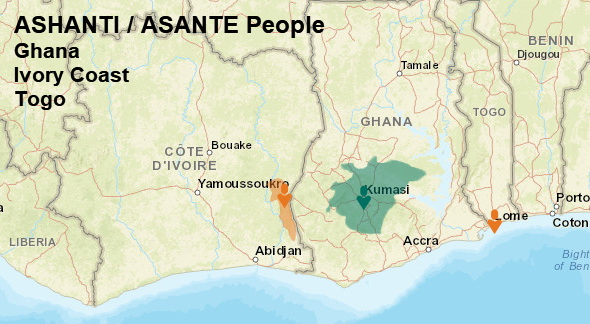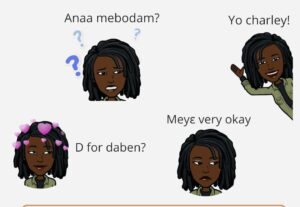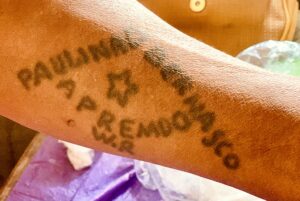
Source: Tribe 101
Asante Twi, alternatively referred to as Ashanti, Asante, or popularly known as Twi, is an Akan dialect situated within the expansive Kwa language family, which is part of the broader Niger-Congo language family. It is spoken primarily in the Ashanti Region of Ghana and almost every part of Ghana with the Greater Accra Region recording a significant number of Asante Twi speakers either as a first or a second language.
Etymologically, there are two schools of thought on the origin of the term “Twi” as used to describe the dialects of Akan namely Asante, Wassa, Akuapem, Bono, Kwahu, etc. The first states that the term owes its inception to the natural inclination of speakers to override and elide certain sounds amidst fast speech. In Akan, “Kasa a yɛreka a yɛtwi fa so”. The second school of thought states that the term ‘Twi’ finds its origins in the title of a prominent Bono king, Nana Bafuo Twi who lived in 1851 – 1864. This historical figure’s name became synonymous with the language spoken by his people (Faber & Faber, 1958).
Just as the other Akan dialects, Asante Twi is also spoken in the southeastern part of Ivory Coast. In total, the language has a combined estimated native speaker population of 20 million (Ethnologue, 2019 Ed.). Twi emerges as not only the predominant language in Ghana but also as one of the most widespread across West Africa and Africa at large.
Asante Twi is sometimes interchangeably used with other Akan dialects, sparking controversy among scholars and language enthusiasts. Some believe all Akans speak Twi, including Akuapem, Fante and Asante, while others argue against it, noting that “Twi” primarily refers to Akuapem and Asante dialects, with Fante being an exception. The controversy was started by a well-known Akan scholar J.G. Chrsitaller advocated for labelling all the principal dialects of Akan as “Twi” with the motivation of enhancing the prestige and economic value of both his Dictionary and Grammar under a more recognizable single term (Dolphyne, 1975).
Till date, there is still an unsettled debate among Ghanaian language lovers and scholars on this single term as to whether all Akans speak Twi or Twi only refers to the Asante and the Akuapem dialects. Despite all the controversies, Asante Twi is mutually intelligible to the linguistic Akan dialects of Fante, Akuapem, Bono, Wassa, etc. (Christaller, 1875; Arhin, 1979).
Asante Twi is widely perceived as easier to learn than other Ghanaian languages. This contributes to its elevated status and prestige. This perception has led to its widespread adoption and popularity, even among non-native speakers who readily embrace and accommodate the language.
Outside of Ghana, Asante Twi is often regarded as the “Language of Ghana,” particularly among English-speaking foreigners. When Ghana is mentioned in conversations beyond its borders, the assumption is often that the speaker is proficient in Asante Twi. For these individuals, the most recognizable so called “Ghanaian language” terms are often “Ɛte sɛn?” meaning “How are you?” and “Akwaaba” meaning “Welcome.” They see these phrases as a familiar entry point into the linguistic and cultural landscape of Ghana. This also sparks arguments and uproar among non-Akans, especially non-Asante Twi speakers, who view the assumption that all Ghanaians speak Asante Twi as misguided and even disrespectful. They consider it ignorant to label every Ghanaian as a speaker of Asante Twi.
The popularity of Asante Twi extends beyond expectations, reaching even areas where its presence might seem unlikely. Surprisingly, significant numbers of people in non Akan regions such as the Northern sector of Ghana, as well as the Volta Region, are proficient in or have a basic understanding of the language. It is estimated that among every two Ghanaians, one may either be a fluent speaker of Asante Twi or possess some basic knowledge of the language. This statistic is particularly surprising considering that Asante Twi is traditionally associated with the Akan states.
Asante Twi is widely regarded as the most marketable language in Ghana. Its popularity contributes significantly to its perceived value in business settings. As a result, proficiency in Asante Twi is seen as an asset that can facilitate smoother transactions and interactions within the Ghanaian market.
Due to the popularity of the Asante Twi dialect in Ghana, it is considered by scholars and language enthusiasts as the “de facto official language of Ghana”. A de facto official language is a language that is not officially recognized as the official language of a country but is widely used and considered as if it were.
Adding to its already considerable popularity, Lionbridge (2023) ranked Asante Twi among the top languages by total online population. According to their statistics, the language boasts a robust online presence with a total online population of 8 million, positioning it closely alongside languages like Swahili, Zulu, Yoruba and Afrikaans.
In February 2024, during a session in Ghana’s Parliament, the Speaker of Parliament, Honourable Alban Bagbin, raised the topic of using a Ghanaian language for parliamentary sessions. This motion immediately captured the attention of Ghanaians, with Asante Twi being the language at the forefront of public discourse.
Academically, Asante Twi has an educational status and it is studied from the basic to the tertiary level. It is also the only Ghanaian language studied in multiple regions of Ghana. It is studied in schools in Greater Accra, Central, Western, Western North, Eastern, Bono and Ahafo Regions and even the Northern Regions. At the tertiary level in Ghana, the language is studied in most Colleges of Education. It is also studied from the undergraduate level to post graduate level at University of Education, Winneba, Kwame Nkrumah University of Science and Technology, University of Ghana and University of Cape Coast.
Asante Twi also stands out as one of the few African languages studied in academic institutions across the US, Canada, and the UK. Alongside languages like Swahili, Zulu, Wolof, and Yoruba, it holds a prominent place in the curriculum of Departments of African Languages, with programs extending up to the PhD level.
Asante Twi boasts a robust presence in both digital and material mediums. Across Ghana, numerous radio and TV stations broadcast in the language. Notable examples include Peace FM, Adom FM and TV, UTV, OK FM, and Hello FM, among others. Asante Twi also serves as the predominant language for a vast Ghanaian entertainment content, including music, movies, skits, and series. These productions enjoy widespread popularity not only in Ghana but also across Africa and beyond. The now-defunct Kumawood film industry, in particular, was renowned for producing movies primarily in Asante Twi, which travelled beyond Akan speaking regions/ states in Ghana.
Asante Twi is renowned for its richness in literature, grammar, and cultural content, continually drawing the interest of scholars. Its vibrant literary tradition includes a diverse range of genres, from poetry to prose and drama, folklore to historical narratives, linguistics and language structure, etc.
The language has both offline and online dictionaries and Bibles. It even has Mathematical and Scientific glossaries. The language is live on most language learning platforms as well. Recently, its text-to-speech features were introduced on the famous Khaya app. It is also live on Wikipedia and its sister projects.
Asante Twi enjoys comprehensive digital support, with dedicated keyboards available on various smartphones and computers. Notably, Apple recently expanded its language options to include Akan, with variants such as Asante Twi and Fante prominently featured.
Additionally, there is a wealth of online content available in Asante Twi, with websites like Akannews.com providing news written entirely in the language. This comprehensive coverage across various platforms adds up to its popularity in Ghana.






Very educative
Thank you. Come back again to enjoy our contents.
Good work done, brother.
Thank you my brother
Very interesting and Educative
Thank you